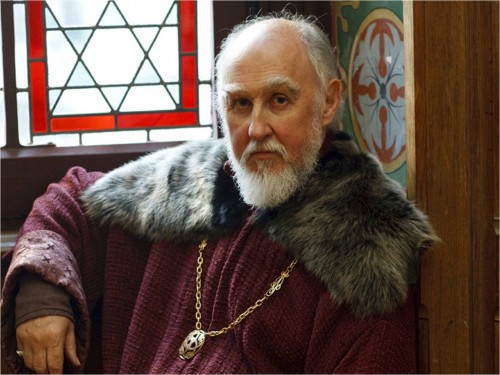Each Thursday, I’ll be stringing together some of the disconnected thoughts I’ve had about the subject of my dissertation in a feature I call “Thesis Thursday“. I’m making up for last week’s pithy entry with a rambling one split into three pages. Forge ahead if you dare.
I’ve obliquely mentioned several times the game that Geoffrey of Monmouth was playing, the outrageousness of his fabrications and his amazing success putting them across, but I’ve not yet gone into precisely what he did. So I guess now’s as good a time as any. So let us meet this Geoffrey of Monmouth head on. We’ll get to his game as soon as we’ve finished the introductions.
In part, my reticence to dive into the whole story is due to its familiarity, at least among the critical set. The vast majority of the facts that compose the scandal de Monmouth have been known for almost a century, and very little has been added to them in the last fifty. Each new generation of critics takes the scattered remnants that history has offered up about Geoffrey’s life and work, arranges them into clever and interesting patterns, some more compelling and plausible than others, and and pits the new patterns against the earlier iterations. This is not to say that good work has not been done, just that no matter how good the work, it has been done done with the same inadequate supply of raw material as the work that it’s displacing.
Depending on which piece of this raw material we chose to put the emphasis upon we might safely assert, as others have already, that Geoffrey was either a Welsh rabble-rouser, a Cornish patriot, a Breton sympathizer, or a Norman apologist; that during the Anarchy that followed the death of Henry I a supporter of Empress Matilda, or of her rival King Stephen, or a peace-broker between the two; that he was either a sober historian in the model of St. Augustine, Virgil, or Boethius; or that he was merely a faithful compiler, a parodist, or an inveterate liar who lied out of an inordinate love of lying, ((Ok, so the last one on the list is a bit older than the last hundred years, belonging properly to William of Newburgh, who was born around the same time that Geoffrey’s Historia was first published. The scandal of the Historia was almost instant.)) and these are only but a few of the many Geoffries on offer.
Alas, most of the known facts about Geoffrey’s life can be safely contained within a single sentence found in the Chronicle of Robert of Torigni, the entry for the year 1152:
Geoffrey Arthur, who translated the history of the kings of Britain from British into Latin, became the bishop of St. Asaph in Wales. ((For you Latin snobs, “Gaufridus Arturus qui transtulerat historiam de regibus Britonum de Britannico in Latinum, fit episcopus Sancti Asaph in Norgualis.”))
As I indicated in the first post in this series, when we first meet Geoffrey in the historical record, well before his History was first circulated, he is not Geoffrey of Monmouth, Gaufridus Monumentensis, but rather Gaufridus Arturus, or Geoffrey Arthur. In fact, the only time we see the name Geoffrey of Monmouth is in the text and dedications of his History. Geoffrey Arthur, on the other hand, was fairly active, as minor twelfth-century clerics go. Geoffrey Arthur signs as the witness to five surviving charters concerned with properties in the vicinity of Oxford between 1129 and 1150, and two more from 1150-51. In those final two, he drops the Arthur, replacing it not with of Monmouth, but with episcopus sanctus electus, or bishop-elect. And those five surviving signatures are about all the evidence we have of where he lived and what he did apart from Torigni and the things Geoffrey claims in the dedications to his History–and nobody is willing to take a guy like Geoffrey at his word.

Apparently, they introduced a character named Geoffrey of Monmouth on the BBC show Merlin, too. Even the BBC can't be satisfied with just the one Geoffrey.
Nevertheless, here’s what Geoffrey tells us in his own words. He claims that his superior Walter, archdeacon of Oxford, somehow came into possession of “a certain very ancient book written in the British language” which contained information on all the kings of Britain from Brutus, its first, on to Cadwallader, kings neglected by the greats, Gildas and Bede. This was a terrible but understandable omission, because no one else had come upon a written account, so those kings’ lives and deeds could only be passed on orally and celebrated privately by the British as a line of greatness extending from Arthur back before the incarnation of Christ and forward from Arthur on to further greatness. Walter charged Geoffrey with translating the book from British into Latin, which he humbly agreed to do.
Later in his History, Geoffrey tells us he had to stop working on this line of kings briefly to translate the prophecies of Merlin from British to Latin at the request of another cleric, Alexander, Bishop of Lincoln. We hear again of Alexander in the preface to Geoffrey’s only other surviving work, The Life of Merlin, dedicated to Alexander’s successor Robert, where we learn that Alexander never showed Geoffrey enough gratitude for his translating, at least in Geoffrey’s mind. ((And perhaps Robert might be so good as to redress his predecessor’s lack, wink wink, nudge nudge, say no more say no more?)) And finally, in the conclusion to his History, Geoffrey tells us again that Walter gave him the book, adding that Walter “brought it out of Britain,” and then he warns other working historians ((Henry of Huntingdon and William of Malmesbury, to be exact.)) not to try writing about the British kings, because they do not have access to said special British book. Since Torigni and his signatures agree that he did one day become bishop, we can perhaps at the least trust that Geoffrey was being somewhat honest about his life; if nothing else, he wrote histories on British subjects (or “translated” them) for powerful Anglo-Norman magnates and clerics in hopes of preferment and reward.
And that’s about that. A few charter signatures, a mention here or there in a chronicle or in another historian’s work, and what he tells us in the fore- and afterwords to his works–this is all we have of Geoffrey’s life to paint our picture of him. And yet we have so many different pictures. If we’re looking to spread the blame out, we could always throw some more Geoffrey’s way.
Even his prefaces and dedications to his History speak to us in multiple voices. Most manuscripts of Geoffrey’s History are dedicated to Robert of Gloucester, a bastard son of Henry I (who happened to be one of the largest landholders in England after the king himself), but some are dedicated to Robert’s later rival, Stephen of Blois, the man against whom Robert warred for the sake of his sister, Matilda, who Henry unsuccessfully tried to place on the throne to succeed him. And at least one was dedicated to both of them jointly. To make things more confusing, some of the ones dedicated to Robert are also dedicated to Waleran, Count of Meulan, who had once rebelled against Henry in his youth and who later married Stephen’s infant daughter Matilda ((By the way, every woman in twelfth-century England was named Matilda. True story. Made buying monogrammed lace handkerchiefs way easier.)) after Stephen seized the throne. Many critics have tried explaining the different dedications by positing timelines (some plausible, some tortuous) for their creation that turn Geoffrey into a canny political player, finger to the pulse of the shifting alliances among England’s nobles in order to best position his work to reap him his due rewards. While I’m willing to credit Geoffrey with a lot, he would have needed to be a Merlin himself to keep track of who was planning to depose whom this week, because, frankly, all hell was breaking loose in England right as Geoffrey was finishing up his magnum opus and casting about for buyers.
[POST CONTINUES ON PAGE 2] ((Which people reading this through RSS readers will have to visit the site to see. Limitations of code suck.))
